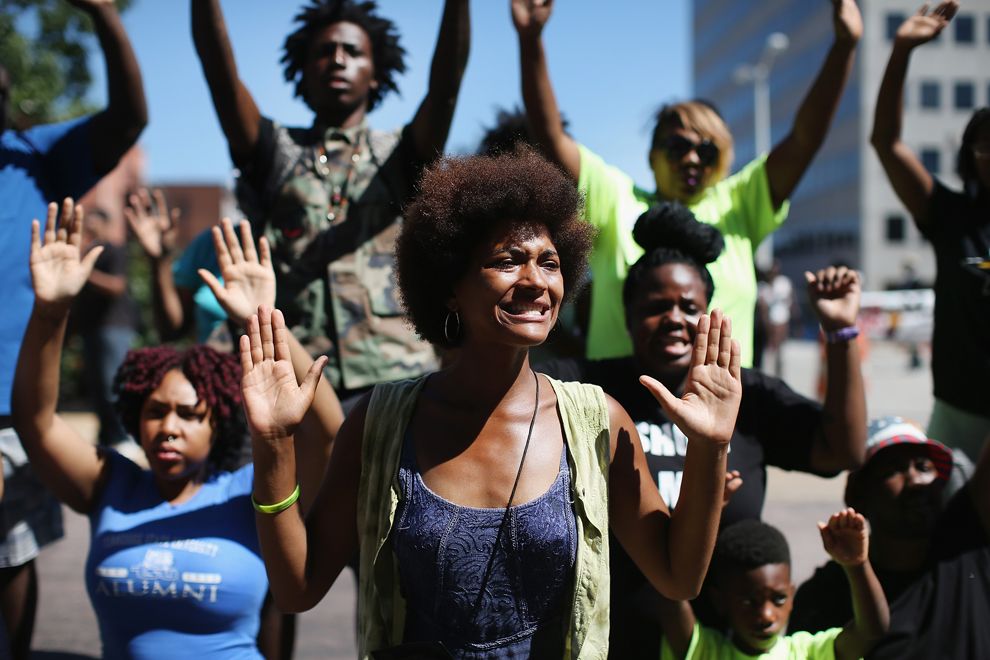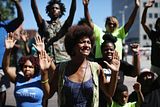What We Need from White Allies in the Fight for Justice

by Brittany Dawson
“Some problems we share as women, some we do not. You [white women] fear your children will grow up to join the patriarchy and testify against you, we fear our children will be dragged from a car and shot down in the street, and you will turn your backs on the reasons they are dying.” —Audre Lorde
On December 3rd, a grand jury found “no reasonable cause” to indict NYPD officer Daniel Pantaleo for the July killing of Eric Garner. Adding more coal to my perpetual and internal blaze, I sat in my apartment, benumbed and embittered, warmed by the fire that swelled beneath my skin. I channeled my irrepressible revulsion for yet another unjust and disturbing incident by writing, a coping strategy I’m sure naysayers of “rioting” and “protesting” would be pleased to see (please note, I am being very facetious!). Tears remained tucked away in their respective ducts and my voice failed to quiver. Silence. Pain. Grief.
While the African American community and others troubled by another unlawful death continue mourning the loss of Eric Garner and Mike Brown, White social justice allies took off their privilege goggles and joined the conversation with hopes of shedding light on the disposability of Black lives. Aside from popular hashtags #BlackLivesMatter and #JusticeForEricGarner, allies pledged their allegiance to standing in solidarity with Black lives and coined a new hashtag to prove it. #CrimingWhileWhite proliferated social media following the grand jury’s decision to forego indictment, painting a scathing portrait of institutional padding that handicaps minorities but protects Whites. White social justice advocates and those conscious of their White privilege gathered around the twitter campfire to tell spooky tales of how these systemic freedoms prevent situations similar to Garner and Brown from rarely occurring.
Got pulled over for doing 70 in a 50 zone, in drag, back in my boy days. Wedding ring got me a ticket for 60. No probs. #CrimingWhileWhite
— Maura Hubbell (@sistawendy) December 4, 2014
#crimingwhilewhite caught with a 1/2 oz, cop asked for id/name, i said no, he said be more careful and he had more important things to do
— ♆ (@drakehaley_) December 4, 2014
Twitter user @PeaceAndCheese summed up the results of this hashtag succinctly...
Reading these #CrimingWhileWhite stories. Must be nice to still be alive to tell your tales of how you got away with it.
— J.I.M.B.R.O.W.S.K.I. (@PeaceAndCheese) December 4, 2014
One implication of these tweets is that by speaking openly about White privilege, we can underline similar injustices and locate ways to stop it. But aren’t we merely pointing to the obvious? Black America is routinely aware of these institutional failures and I’m genuinely unsure how this helps dismantle the white supremacist capitalist patriarchy. After all, the notion of “checking privilege” purports an idealistic notion that solely speaking or realizing White privilege is enough to end all oppression, when in fact, it’s just one of many steps to seeking justice.
Even when I logged on Facebook to locate other “allies”, I saw clumsy status essays that valued Eric Garner’s death for its significance as opposed to Mike Brown’s. And “tips” on how to protest peacefully flooded my timeline, a haunting reminder of how some allies use their privilege to give minorities a manual on how to react.
Today, it seems as though we are becoming increasingly divided along “race lines.” So do we need white allies in the fight for justice? Some would argue yes! To rebuild our communities, we must ask those who benefit from White privilege to initiate critical reflections on the realities of their privilege and how they can create space for minority and marginalized groups.
However, based on reactions to Eric Garner’s death, it is obvious that we still need a shift in attitudes on what it means to be an ally. What is markedly the most caustic problem of having privileged allies in the fight for justice is how some adopt the term “ally” with hopes of benefiting from or getting rewarded for the value it carries.
As Mia McKenzie poignantly writes: “White people who claim to be anti-racist, non-disabled folks who claim to be invested in challenging ableist norms, cis queers who claim to understand the importance of trans* visibility. People claim “ally” for themselves regularly and with ease. But the truth is that being an ally takes more work than most of us imagine. In fact, it takes constant vigilance. And there are many ways we fail at it every day. Frankly, some of us are just totally doing it wrong.” When the term ally becomes a way for privileged folk to determine how we grieve, when we should take action, what is considered worthy of national attention, and who is given agency, allies transform back into disempowering forces.
White allies become problematic when they assume the role of gatekeeper, controlling how the public perceives the action of making social change and the groups impacted by these inequities. Historically, Black voices have been criminalized to the extent where speaking out against social inequalities was punishable by death. Black folks needed White allies to speak with them. But it’s 2014 and this paternalistic model of social justice is no longer needed. Notwithstanding allies’ ability to assist towards change, we all yearn for a day when we carry our own agency and are able to vocalize our struggles without needing “help”.
When the term ally becomes a performance, this is where the danger seeps in. As stated in an article featured in the National Association of Student Personnel Administrators Journal of 2006, “Some who genuinely aspire to act as social justice allies are harmful, ultimately, despite their best intentions, perpetuating the system of oppression they seek to change. Different underlying motivations of those who aspire to be allies can lead to differences in effectiveness, consistency, outcome, and sustainability.” This explains what Mia Mckenzie refers to as “allies” who boast about fighting in the trenches for social justice in search for a pat on the back, a cookie, a trophy that says, “Wow, thanks for doing what you’re supposed to do!”
In fact, the inability to give ample space and voice to the groups and communities they claim to support showcases their unwillingness to relinquish their seat to make room at the table for other lived experiences. We’re all fighting for space, nudging and stomping on the toes of others who refuse to make room for others. I’ve witnessed self-professed social justice advocates cry foul play on the ruling against Darren Wilson yet devalue the significance of trans pioneers like Dr. Kortney Ziegler, Janet Mock, and Laverne Cox, saying things like “Well…that’s not the same as being enslaved or whipped or hosed down by police.”
We can’t discredit the allies who risked their lives to bring issues of injustice to the table. But these real allies listen, stay informed, and allow space for those who are actually being silenced, subjugated, and disenfranchised.
They know that their place is on the margins not at the center
Photo Credit: Scott Olson/Getty Images
Brittany Dawson is a regular contributor at For Harriet. She is a senior at the University of South Carolina who is passionate about equality, social justice, and education. You may follow her on Twitter: @BrittanyJDawson.

No comments: